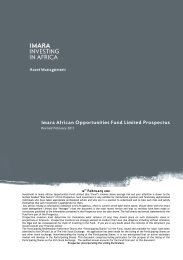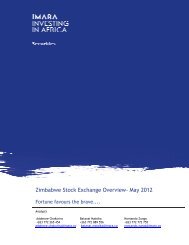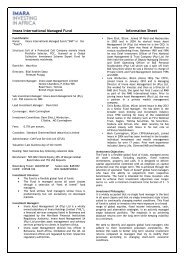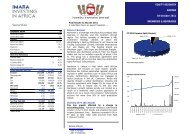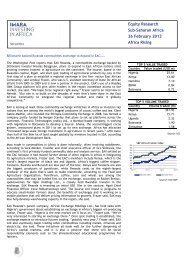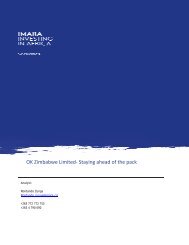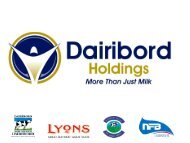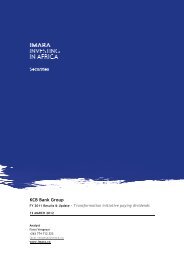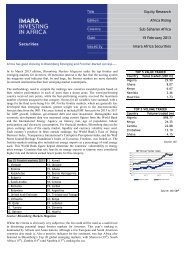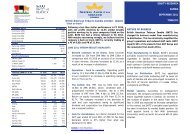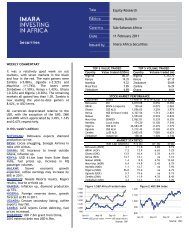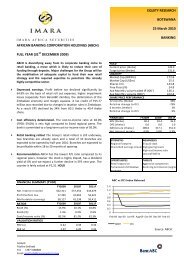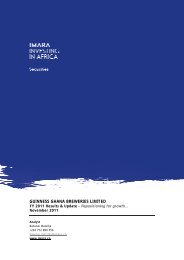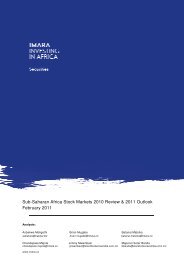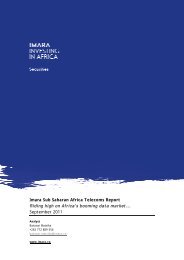Nigeria Banking Sector Coverage - December 2011 'Bad ... - Imara
Nigeria Banking Sector Coverage - December 2011 'Bad ... - Imara
Nigeria Banking Sector Coverage - December 2011 'Bad ... - Imara
Create successful ePaper yourself
Turn your PDF publications into a flip-book with our unique Google optimized e-Paper software.
In its 9M 11 results to September, ETI continued to gain<br />
from margin improvements on interest income, as net<br />
interest income put on 16.16% to USD 399.0m, with NIMs<br />
up 60bp y-o-y but up by 30bp compared to H1 11, to<br />
6.2%. Fee and commission income gained 49.06% to USD<br />
278.9m, and net fee and commission went up by 45.16%<br />
to USD 263.3m, diluted by the 2.74x increase in fee and<br />
commission expense. While lease, dividend and other<br />
operating income were down y-o-y, their drop was more<br />
than compensated for by the 64.79% increase in net<br />
trading income to USD 131.6m. Operating income for the<br />
period was up 29.88% to USD 804.3m.<br />
Operating expenses saw a steep increase of 24.76% to USD<br />
546.2m, with staff costs going up by 22.77% to USD<br />
251.4m and other expenses rising by 31.66% to USD<br />
240.5m. Increased levels of compensation were said to be<br />
the main driver of the staff cost increase, while<br />
expansion and inflation drove other expenses growth.<br />
With revenues growing ahead of expenses growth,<br />
however, the cost to income ratio improved to 67.91%<br />
from 70.70%.<br />
Provision charges registered an increase y-o-y of 26.73%<br />
to USD 80.4m, a function of a growing loan book and<br />
management’s decision to be conservative with<br />
provisioning to boost reserves. All the regional clusters<br />
recorded a decrease in the charge with the exception of<br />
Francophone West Africa, which saw a 116% rise driven by<br />
high increases in Burkina Faso, Togo, Cote d’Ivoire and<br />
Mali. Management points out that the possibility of<br />
significant write backs come the year end exists due to a<br />
large proportion of “discretionary” provisions. PBT<br />
increased by 50.58% to USD 177.7m and attributable<br />
earnings closed the period at USD 106.6m, up 51.86%. EPS<br />
for the period was US 1.08c, up from US 0.71c. The retail<br />
banking arm, or ‘Domestic’ business was the worst<br />
performer, with a PBT contribution of USD 6.4m, while<br />
the Corporate banking business contributed USD 96.3m<br />
and Ecobank Capital contributed USD 72.1m.<br />
The balance sheet was flat quarter on quarter, up just<br />
0.97% to USD 11.9bn. Loans and advances to customers<br />
went up by 4.46% to USD 5.7bn, with holdings of treasury<br />
bills down 17.63% to USD 650.2m and trading assets down<br />
40.83% to USD 9.8m. The NPL ratio improved to 5.7% from<br />
13.6% at 9M 10 and 7.2% at H1 11. This was attributed to<br />
more NPL sales to AMCON, (customer loans in <strong>Nigeria</strong><br />
actually down y-o-y), and the aforementioned prudent<br />
approach to lending, as well as write offs.<br />
Customer deposits, like loans and advances, were largely<br />
unchanged q-to-q, shedding 0.94% to USD 8.9bn, with the<br />
focus remaining on growing the low cost current and<br />
savings accounts, which were marginally higher at 77.74%<br />
of deposits compared with 77.0% at half year. The LDR<br />
was 64% compared with 61% at H1 11, while the CAR<br />
ended the period at 19.5%, unchanged from the H1 11<br />
position.<br />
Outlook<br />
Having hitherto been on an aggressive growth drive,<br />
ETI notes that bar another 5-6 countries, its<br />
geographical expansion programme is reaching the tail<br />
end. We expect that as the group moves into a<br />
consolidation phase, it should begin to realise more<br />
benefits from its diversified earnings base, while the<br />
CIR should start to trend downwards. Opportunities<br />
for cross border trade activity should also increase,<br />
especially as the continent is encouraged to push for<br />
more intra-regional trading.<br />
ETI has always targeted being in the top 3 banks in<br />
countries where it is present. While achieving this in<br />
roughly half of its markets, this has not been the case<br />
in the key <strong>Nigeria</strong>n market. Extended talks to merge<br />
with First Bank collapsed, but following the banking<br />
crisis, ETI identified one of the wounded, Oceanic<br />
Bank, for acquisition. ETI on 24 October confirmed its<br />
100% acquisition of Oceanic. This was the first stage<br />
of the transaction, with the second set to be the<br />
merger of Oceanic with Ecobank <strong>Nigeria</strong> and the third<br />
the provision of additional capital by ETI to bring the<br />
minimum CAR of the new entity to 16%. The total<br />
transaction consideration saw: AMCON invest NGN<br />
290bn in Oceanic to bring its NAV to zero and ETI<br />
paying NGN 55bn to Oceanic shareholders. The NGN<br />
55bn was split 70% into c2.5m ETI ords and 30% as<br />
c1.1m participating cumulative prefs. This will<br />
achieve ETI’s goal of becoming a tier 1 bank in<br />
<strong>Nigeria</strong>, creating a bank with over 600 branches and<br />
1,450 ATMs. ETI recently announced that strategic<br />
partner Nedbank had provided it with a USD 285m 3yr<br />
convertible facility which Nedbank can choose to<br />
exercise between 24 and 36 months’ time to become<br />
a 20% shareholder in ETI (valuation implications are<br />
obvious). No further details of the facility were<br />
availed, although part of the funds will go towards the<br />
Oceanic acquisition. If the conversion does occur, this<br />
should prove positive for both parties.<br />
Aside from the <strong>Nigeria</strong> expansion, ETI also hoped to<br />
conclude the acquisition of Trust Bank in Ghana in Q4.<br />
However, it seems some local opposition to the<br />
transaction may delay the conclusion, with the BoG<br />
having set up a panel to look into the concerns.<br />
Valuation and Recommendation<br />
Pre-Oceanic, we value ETI, based on a DCF valuation,<br />
at US 10.8c per share, representing upside of 68.2%<br />
against the US 6.42c it currently trades at on its most<br />
liquid listing in <strong>Nigeria</strong>. (Upside is 34.46% on the BRVM<br />
and 58.95% on the GSE). A coverage based PBV<br />
average based on the last published post merger proforma<br />
accounts suggests a valuation of US 10.3c per<br />
share. While there do appear to be arbitrage<br />
opportunities across markets, the length of the<br />
process involved in moving shares across registers<br />
largely makes the trade unattractive as prices could<br />
move against one very quickly. BUY.<br />
11



